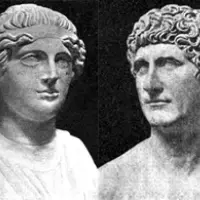Many years of work, translations, publications and conferences. A journey started with translations of Masoretic Hebrew manuscripts, made for the catholic Edizioni San Paolo. Not a simple publishing house. Who are we talking about? Without any doubt of Mauro Biglino, one of the most provocative figures in recent years, both in Italy and abroad. He is been carring out classical studies and for about thirty years he has been interested in study of religious texts.
He began with San Paolo translations, that published 17 books of the Old Testament from Leningrad’s Hebrew code; whereupon he issued his books and gave lectures throughout Italy on what his studies brought to light.
His books, translated even abroad, came out from an accurate analysis of Hebrew writings and reveal what those writings really mean, their keys of interpretation, explaining literal meaning, instead of the “symbolic rendering” of Bible.
Biglino invites people to read the Bible in a literal sense only. Many times in his books he claims to analyse matters investigated with the wording “Let’s pretend that…”, starting from the assumption the present Bible is not that one written originally.
He has never treated religion or spirituality, but he literally translated sacred texts up to reaching an assertion which has caused sensation: “the Bible doesn’t talk about God!”
What does the Bible really talk about?
Very briefly, as I made clear in “La Bibbia non parla di Dio (The Bible doesn’t talk about God)” and in “Il falso Testamento (The fake Testament)” – Mondadori 2015/2016 -, it seems to me the Bible treats of a chronicle, a story between Jacob’s (or Israel’s) family and an individual called as Yahweh, belonging to the Elohim’s group, whose leader, Elyon, charged him to rule those people (of Israel, Dt 32): he makes that in a clear way, openly and, above all, exclusively.
90% of those who believe the Bible message, ironically, have never read it; a faith based on wrong translations. When we talk about ancient languages we are never sure of it. In your book “The Bible doesn’t talk about God” it refers to a word suggesting Almighty Lord. What is this word and what does it really mean?
Answer is very easy for me because I can mention just what the Bible of Jerusalem says in note (Gen. 17,1): the Hebrew term SHADDAI, which is usually translated as Almighty, doesn’t have that meaning but, much more likely, it should mean “Lord of steppe”. As they are themselves to write it [clergymen], it would be fine, or better still, it would be fair and honest, the Bibles did not contain that translation any longer, which is clearly a theological interpretation, born because of defining as such that god. Theology itself is used to giving him those skills and features which have nothing in common with the biblical figure of Yahweh, turned into the alleged “God Father” of Christianity.
Is the Bible an instrument of social control?
The Bible in itself wouldn’t be that, if it was read and explained for what it really says: the story of a family living in the Land of Canaan under the command of its governor called Yahweh. Control is wield for centuries, with extreme efficiency, on the basis of what has been conceived starting from that book, but in absolute defiance of what is written in it. The controllers’ luck is that controlled not read it with open and clear mind: in the few cases of doing that, they are conditioned by theological filters, elaborated just to avoid understanding what is actually written in that set of books.
Who are the Elohim? Are they still among us?
In “Antico e Nuovo Testamento, libri senza Dio” (“Old and New Testament, books without God”) – Unoeditori, it. 2015, en. 2016 – I led a specific analysis of how many times that term appears: I realized Elohim (plural word) clearly suggests a group of individuals who had shared lands in governorships/kingdoms and then, as always occurs, they fought against each other to increase power and richness. The term Elohim, fortunately for us, doesn’t indicate God, but persons in flesh and blood. I don’t know if they are still amongst us, but if one day somebody discovers it’s so, I won’t amaze at all, since the system governing us, the financial one in particular, is set with extraordinary precision on the Bible instructions: I refer to the debit/credit system.
In the study of Sacred texts of various cultures we can notice the uniqueness of religious content which joins every human beings. For example, the king of Moabites, Mesha, says exactly the same things the Bible tells about Yahweh. Everyone talks of his “Elohim” in the same way. Were Phoenicians, conquerors of the Mediterranean, Greeks, who spread culture, and Romans, rulers of the world, so silly to worship just stone pieces? Is it possible they had met Elohim as well?
According to me it’s not only possible, but I think it’s reality, actual facts. The books I mentioned before (namely those published by Mondadori) contain a parallel study between the Bible and the Greek texts, from which it appears that those writings tell the stories of the same individuals (Elohim/Theoi) having the same features, the same needs, the same attitudes, the same behaviour, even the same neurophysiological requirements, the same technology, clearly depicted also in the Bible… In my humble opinion, sooner or later, it will take note which Ancient peoples of each mainland have told us so far the same history: all of them had as commanders/rulers/governors the Elohim/Theoi/Dei/Devas…
I’d want to specify that, if in the next 2000 years Christianity is studied with the same interpretive categories today applied to the peoples you appropriately referred to, our western religion will be doubtless defined “idolatrous”, as well as we tend now with people considered pagan, whorshipers of vain stone idols.
When you’ll realize, from this point of view, there isn’t any difference between us and them it will make a big step forward.
The Bible is senseless because it wasn’t given it the right interpretation. It’s a tale of war and it narrates a deal, a covenant, between a family and a definite figure.
Therefore, isn’t there any agreement/covenant of God with humanity?
Answer is clean and sharp (“Il falso Testamento” – “The fake Testament”, Mondadori): Yahweh made an exclusive deal with the Israel’s family (covenant). This is what the Bible talks about.Humanity is not involved at all: peoples dramatically involved were just those who lived, occupied territories object of interest of Yahweh and his own group. The relationships were unidirectional: they had to adapt and accept newcomers (invaders) or to be fought and often completely destroyed. The amazing thing is that it was about close kins, very close, of Israelites: they belonged, in fact, to the same Abraham’s family. The rest of mankind had nothing to do with those internal struggles, led to grab small pieces of land in that tiny part of the planet.
You trace the Bible back to a kind of diary referring events recorded by our ancestors, as well as it seems to be happened for other historcal writings. In Vedic literature there are Vimanas (flying machines), in the Bible similar flying objects seen by Moses and, even in the Assyrian-Babylonian tablets, they are described and detected in various places of the planet. Different peoples tell us all the same stories. Why don’t we have any archaeological traces of these extraterrestrial technologies?
Traces are so many and the firsts are made up of megalithic structures which, despite attempts wholly lacking credibility, no one can explain, as even ourselves would have great difficulty in building them up. In this regard I recommend reading Marco Pizzuti’s book “Scoperte archeologiche non autorizzate” (en. “Unauthorized Archaeological Discoveries”), because it’s emphatically enlightening. I remember, moreover, the official statement released on October 2016 by the Iraqi minister of Transport, Kazem Finjan, who claimed Babylonian ziggurats were launching ramps for space travels (news reported on October 3, 2016 on all the most important press services).
Why do being so powerful and technologically advanced like the Elohim, according to you, make use of people of the Earth in order to gain power in a desolate place, so little and peripheral, whereas they could by themselves achieve it easily? Do they need to be worshipped?
Actually, power in that little land was an affair which concerned just some of them, very few and of little importance within Elohim’s group. The Bible gives us also some of their names: Yahweh, Milkom, Kamosh, Ashtoret… Other peoples told us the stories of their fellows, much more important and mighty: they are those who reigned over great civilizations such as those of Sumerians, Egyptians, Assyrians, Babylonians, Indians, South central American people, etc… We must therefore bring all within the correct proportions. History, influenced by the Judeo-Christian religion, puts people of the Bible and its chief at the heart of humanity events: then, it was not like this! Those internal strifes hadn’t interested the Great Powers (Assyrians, Babylonians, Romans) that, when they decided to end the riots off in the Land of Canaan, took part there without Yahweh could make any kind of contrast. Like all the powerful of all time also “those guys” needed/had pleasure to be served by subjects used to work for them: no difference.
Luckily “those guys” are not God.
The god the Old Testament talks about communicates through his spokesman (like prophets) and sometimes face to face, while forcing the listener to remain at a safe distance. If it was so, what would the language of those periods be, supposing Hebrew language seems to have been created on purpose for the Holy Book? Is it possible Semitic languages or those ones spoken at the time in the Near East had been influenced by extraterrestrial rulers (Elohim) or are themselves not of this earth, like Sumerian might be from Anunnaki?
Semitic languages spoken at the time were Akkadian, Amorite, Aramaic, Ugaritic and various Canaanite languages. Researchers (for instance Prof. Giovanni Garbini, Università La Sapienza di Roma) place the origin of the Hebrew language around the tenth century. B.C. and they show it as an evolution of a south-Phoenician dialect. It’s obvious to think that, at least in origin, the earliest forms of writing were transferred to different peoples from their rulers. Sumerian, for example, turnes out to be a language absolutely original, belonging to a civilisation appearing in the Middle East, exceptionally and already completely formed, with knowledge in many different areas: from agriculture to astronomy, from architecture to maths, from writing to breeding. This feature suggests a source can not be reduced to a slow cultural evolution, but rather to the effect of an intervention which we could generically consider “external”.
In Deuteronomy 32,8 et seq. it’s narrated the sharing out of territories between Yahweh and the other Elohim. This brings to mind “The Critias” of Plato, where the protagonists underline Theoi (the gods) had what they had wanted, after a partition. There’s a strong correspondence, the same we find also in the Sumerian-Akkadian tablets. Still in “The Critias”, Plato tells us about Athens 9000 years before the one we know. Wanting to emphasize this correspondence, is it possible that Plato shows us an old-terrestrial population and that the same Elohim are exactly this population and not extraterrestrials?
Everything is possible and we have to be open to any suggestion: I leave to others the dogmatic certainties. That matters is understanding the Bible talks about “those guys”, whoever they were, and not about God. I just point out peoples of every continents tell of “those guys”, qualifying them generally as “Sons of the stars”; in the absence of certainty and expecting the truth, I act with them exactly like I do with the Bible, that is “I pretend that…”.
In your last book “Il falso Testamento (The fake Testament)” there are many pages dedicated to a particular Bible passage, with many quotes of rabbinical studies, treating a tough topic: during the extermination campaigns, “god’s people” left alive only little girls who were at least 3 years old and one day as it was lawful to have sexual intercourse with them. In our Bibles, instead, how is this interpreted?
Since theology doesn’t accept this very hard truth, the passage of the Book of Numbers 31 you mentioned it’s rendered with a decidedly softened translation: where the Bible (in the translations of the same Hebrew translaters as well) talks about unequivocally little girls, the translators faithful to the traditional doctrine, in an attempt to make it acceptable, write “girls, young women, maidens”. What is even more dramatic is that, as evident in the Bible, little girls intrigue even Yahweh, the alleged God. I will not dwell here because I devoted to the subject several pages in the book you kindly cited.
The Catholic Church, mostly by the innovative ideas of Pope Francis, seems to be changing. Do you think they are preparing us to a new openness and a new truth?
I believe this is inevitable: they can not keep under control knowledge anymore, which is spreading now with a great swiftness, unimaginable just few decades ago. The way forward is clear by now and Church is going to distance from the Old Testament, focusing on the New. In any case the issue won’t change; if indeed the Old Testament didn’t talk of God the question unavoidably is: which God Father would send Jesus?
You affirm in the Genesis there is no creation and what is narrated is the way Elohim took action on a species living on Earth with a low evolutionary status. Are we the outcome of genetic engineering intervention? why do you have this belief?
I’ve come to realize that because it’s what the Bible clearly says. It’s openly declared by the largest part of Jewish exegesis which this Text tells about genetic engineering. There are rabbis who openly talk together in order to understand from which parts of body the cells needed to proceed with cloning interventions had been taken, useful when Adamites were produced. Also a part of mainstream science is studying it very seriously and I’m sure, in the next few years, even in the western Christian world, finally it will talk peacefully of those subjects, at the moment still object of disbelief, derision, sarcasm. The path has started up and will not stop any longer.
Last question: do you believe in God?
I do not know anything about God, I do not have the certainty of the believers, nor those ones of the atheists. I think nobody knows anything of God, even if, throughout history, about him it has been told (conceived, processed, thought, speculated, invented?) everything and its opposite. With this background, and in the belief that in any case I wouldn’t get to any certain conclusion, I prefer not be interested in it.
I study the Bible, which doesn’t talk of him, but the reason I don’t talk about this doesn’t mean he doesn’t exist: I don’t know this.
Interview by Luana Casalnuovo
English translation edited by Domenico Asprella
@copyright cover image:
http://www.creatorsmovie.it/it/il-primo-cavaliere-dellapocalisse-seconda-parte/
Link interview in italian: https://atomic-temporary-120825066.wpcomstaging.com/2017/01/06/intervista-a-mauro-biglino-la-bibbia-non-parla-di-dio/
Categorie:ATTUALITÀ











3 risposte »